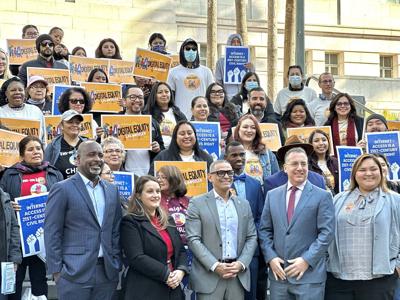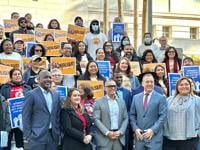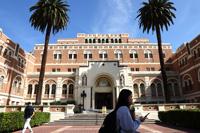
Participants at the State Digital Equity Panel in December 2023. Photo by Brenda Verano
It has been more than 41 years since the Internet was created, yet too many Californians still don’t have access to fast, equitable and reliable broadband service. Assembly Bill 2239 (AB 2239), introduced earlier this year, could soon make California the first state in the nation to create a more inclusive and equitable digital landscape and ensure all its residents can fully participate in the digital era.
The bill, which was authored and introduced by Assemblymember Mia Bonta (D-Oakland) in February, would codify the Federal Communication Commission’s (FCC) newly adopted definition of digital discrimination as California law and allow broadband providers to be held liable for discrimination of access if they follow through on business decisions that “have had the practical effect of discriminating.”
With the passing of AB 2239, Internet service providers (ISPs) that operate in California could face lawsuits and be persecuted by the state if they, either directly or indirectly, engage in digital discrimination practices.
According to the FCC, “digital discrimination of access" is defined as “policies or practices, not justified by genuine issues of technical or economic feasibility, that (1) differentially impact consumers’ access to broadband internet access service based on their income level, race, ethnicity, color, religion or national origin, or (2) are intended to have such a differential impact.”
On Wednesday, CALÒ News, in partnership with La Opinión, spoke with Bonta about AB 2239, her involvement in authoring the bill, the bill's support and opposition and the next steps.
“This bill came forward to me from a collective of over 130 advocacy organizations that have been doing work in Los Angeles, the Central Valley, the Bay and Oakland that I get to represent,” Bonta told CALÒ News and La Opinión.
Bonta, who was elected to serve California’s 18th Assembly District in a special electionin 2021, was born to Puerto Rican parents and grew up in the Bronx. She recalled two instances that inspired and drove her advocacy for digital equity.
One incident occurred in Union City, a city in Alameda County, where she ran an early literacy program. “We used to give out tablets to family members, largely Latino Spanish-speaking families, to be able to ensure that they could have the ability to teach and help teach [their] children how to read and use their voice from a very early age,” Bonta said. “I had one of the mothers come up to me and she said, ‘I would love to be able to help my child learn to read, but I don't even know how to turn on a tablet.’ She had embarrassment about the fact that she knew that it was a tool that was available to her and accessible to her, but she didn't know how to use it.”
A second incident came later in her career. “COVID-19… I heard about so many students who were sitting outside of a McDonald's in order to be able to get access to broadband so that they could participate in their studies,” she said. “I think certainly my renewed interest came at the height of [COVID-19] when I saw so many Latino family members and community members being left behind because they didn't have that basic access that [they] needed.”
To show the inequities in real time, AB 2239 and its supporters have referenced multiple studies that show discriminatory practices from internet providers that have worsened the digital divide and created what experts are calling “digital redlining” in different communities and cities in California.
In one of the studies, Oakland Undivided, an internet advocacy nonprofit and a sponsor of AB 2239, Hubble IQ and the Oakland Unified School District, showed that families living in low-income neighborhoods in Oakland are receiving worse internet performance than those in wealthier neighborhoods, subjected not only to low internet speeds but also to a higher fees.
The study, titled “Digital Exclusion in Oakland,” ran an internet speed test every time a student attempted to access the internet while at home, gathering a data bank of internet performance for students from all of Oakland’s neighborhoods. The analysis included data from the largest wireline and wireless internet service providers in Oakland (AT&T, Comcast, Sonic and T-Mobile), showing that internet connections in the highest-income zip code, with the largest population of white residents, were nearly ten times faster than the poorest neighborhoods, where the city's largest population of people of color resided.
For example, according to the study, Oakland’s 94618 zip code, with the highest median household income of $220,000 and a population of only 31% people of color, had an average internet speed of 97 megabytes per second (Mbps). In contrast, Oakland’s 94621 zip code, which has a median income of $54,000 and the highest population of people of color (91%), had an average internet speed of only 15 Mbps.
A second study that also revealed the internet inequalities existing in low-income communities in Los Angeles was the California Community Foundation's (CCF) report titled “Slower and More Expensive: Internet Pricing Report."
The 2022 report revealed that residents of higher-poverty communities are routinely offered more expensive, slower services than those in wealthier communities. The report, which was a community-led and community-driven effort, published pricing for internet service provider Charter Spectrum, which shows a clear and consistent pattern of the provider reserving its best offers (high speed at low cost) for the wealthiest neighborhoods in L.A. County.
For example, the average price of “Internet,” the brand name for Charter Spectrum’s service tier, offering up to 300 Mbps download speeds (advertised at 133 of the 165 addresses in the report), is nine dollars higher in high-poverty neighborhoods than in wealthy neighborhoods, at $50 per month versus $41 per month.
The report also showed that people who live in higher-poverty neighborhoods like South L.A., Watt or East L.A. are not only routinely offered slower service at higher prices but are also offered contracts with worse terms and conditions. Charter Spectrum’s promotional offers, guaranteeing a period before prices will increase, are for two years in wealthy communities but only one year in high-poverty communities. Charter Spectrum’s low-cost plans are not consistently advertised to households in high-poverty neighborhoods.
The Markup also published an investigation that showed that the digital inequity phenomenon bypasses several state lines, making it a nationwide problem. The investigation showed how ISPs in 38 U.S. cities, including AT&T in L.A., were offering high-speed broadband connections for the same price as sluggish ones to different households in the same city. “In almost every case, lower-income, less-white and historically redlined neighborhoods tended to disproportionately get offered the worst deals,” Markup stated.
The Markup investigation also found that AT&T was 21 percentage points more likely to offer slow service to households in L.A.’s poorest neighborhoods than the company provided in the city’s richest areas.
Bonta said that as one of the largest municipal governments, L.A. has served as a role model for bigger entities like California to tackle digital discrimination in all its forms. Bonta is referencing the motion to eliminate digital division and discrimination, which was unanimously passed on January 26 by the L.A. City Council.
The historical decision began its journey in local government (City Hall) last December when Councilman Marqueece Harris-Dawson, author of the motion, the Digital Equity LA Coalition and other digital rights advocates gathered outside of the steps of City Hall to commemorate and introduce the groundbreaking motion.
It now allows L.A. residents to file complaints against public or private internet providers if they feel they are being subjected to digital discrimination. The city is now mandated to investigate these cases and determine if internet service providers limit investments in the installation, expansion or upgrading of internet service infrastructure within specific geographic areas.
“Access to broadband is absolutely critical for full participation in modern society, and the pandemic has laid bare the systemic problem of inequitable access across historically disadvantaged populations,” stated the motion. “Low-income communities, people of color, immigrants and seniors are all disproportionately disconnected.”
For AB 2239, the fight for passage continues. Bonta told CALÒ News that the biggest challenge with the bill has been that it has met with a lot of resistance from the internet industry, which, according to her, refuses to be held accountable to a standard of digital discrimination.
“In many ways, I consider this a David and Goliath situation because we have coalitions of people who are advocates, who are fighting for this basic right and this basic need, up against some very, very powerful forces who would like to just have us maintain the status quo, which for the coalition and for me is unacceptable,” she said.
Six months since its introduction, the bill has passed the State Assembly and now sits in the Senate Committee on Appropriations, a standard procedure for bills that can have a large financial impact on the state. “That is a very hard committee to get through because it's where the state determines whether or not the policy that we put forward is going to have the appropriations or the funding to be able to support it,” Bonta said.
The primary costs are tied to the public dollars that would allow for lawsuits filed by the California Department of Justice and public attorneys against ISPs that engage in digital discrimination practices.
“We've already been told by the Department of Justice that it would not cost so much for them to take on the responsibility of filing suit in the event that there was digital discrimination,” she said. “In terms of overall costs, it is relatively an inexpensive proposition, especially when on the other side, we think about the people who will continue to be disconnected.”
Bonta also said that, despite the need to hold ISPs accountable, the bill would also require a “disparate impact standard” that would require public attorneys to show that there have been quantifiable business practices against specific communities.
“The reality is that the disparate impact is a very high bar to meet and on top of that, we're limited to public attorneys. For me, it's an even higher standard because public attorneys have to justify spending public dollars to file suits,” she said. “Public attorneys should have enough evidence and pull together enough evidence to establish...before they decide to file suit.”
The Senate Appropriations Committee is expected to announce today whether or not it has passed and been approved by that committee.
“Latino communities are still experiencing, as you said, not the kind of service quality that they need, not the kind of speeds that they need to be able to commit to and be civically engaged, have the health care that they deserve access to, or have the kind of education connection that they need,” Bonta said. “We need to do what we've always done, which is fight. We need to continue to use our voice to say that regardless of where we are, what our status is or what our economic opportunities are.”











(0) comments
Welcome to the discussion.
Log In
Keep it Clean. Please avoid obscene, vulgar, lewd, racist or sexually-oriented language.
PLEASE TURN OFF YOUR CAPS LOCK.
Don't Threaten. Threats of harming another person will not be tolerated.
Be Truthful. Don't knowingly lie about anyone or anything.
Be Nice. No racism, sexism or any sort of -ism that is degrading to another person.
Be Proactive. Use the 'Report' link on each comment to let us know of abusive posts.
Share with Us. We'd love to hear eyewitness accounts, the history behind an article.